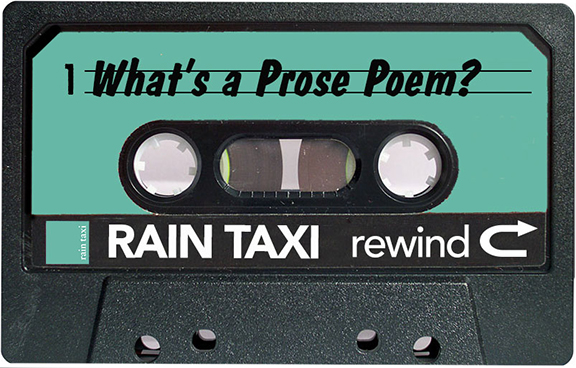
What’s a prose poem? It’s a question we were asking fifteen years ago and still wonder about today, even though we all agree the form has been around long enough for some of our favorite writers to master it. Of all literary forms, the prose poem might be the most slippery to define. In fact, many of us think about it in terms of what it isn’t: the prose poem is too lacking in poetic structure to be a conventional poem, and yet too attentive to its own rhythm and sound to be treated as pure prose. This classification has certainly generated some animated discussion from the literary world, from critics and scholars to the writers themselves, including a legendary 2001 piece by a particularly opinionated reviewer, an author whom we revere and celebrate for . . . well, not prose poems.
But most lovers of the form have realized that the problem with defining it isn’t a problem at all, but its best feature. The prose poem is elastic, and the gap it occupies between two established genres has become a space for some of the most memorable experimentation in contemporary literature. It can be the form for writers with great ideas that don’t fit formal convention, or the tool we use to stretch the borders of genre. It can be whatever it wants. And so the conversation over the nature of the prose poem carries on, and thankfully, so will the pieces themselves. With any luck, the “form” will continue to be as hard to describe as it was around the turn of the century. Perhaps the best we’ll ever do in tacking it down is with the same phrase the United States Supreme Court famously used to define pornography: “I know it when I see it.”
Rain Taxi’s best pieces on the prose poem from 2001:
“The Indexical Book Review” by David Foster Wallace
Spring 2001, Print
In reviewing The Best of the Prose Poem, Wallace gives us highly memorable commentary on the prose poem by creating a transgeneric form of his own.
“Language as Felt: An Interview with Alice Fulton”
Summer 2001, Print
MacArthur Fellowship-winning poet Alice Fulton discusses turning “plainstyle” into poetry.
“On the Street Where You Live: An Interview with James Tate”
Fall 2001, Print
The inimitable James Tate talks about narrative, poetry, and ending up somewhere in between.
